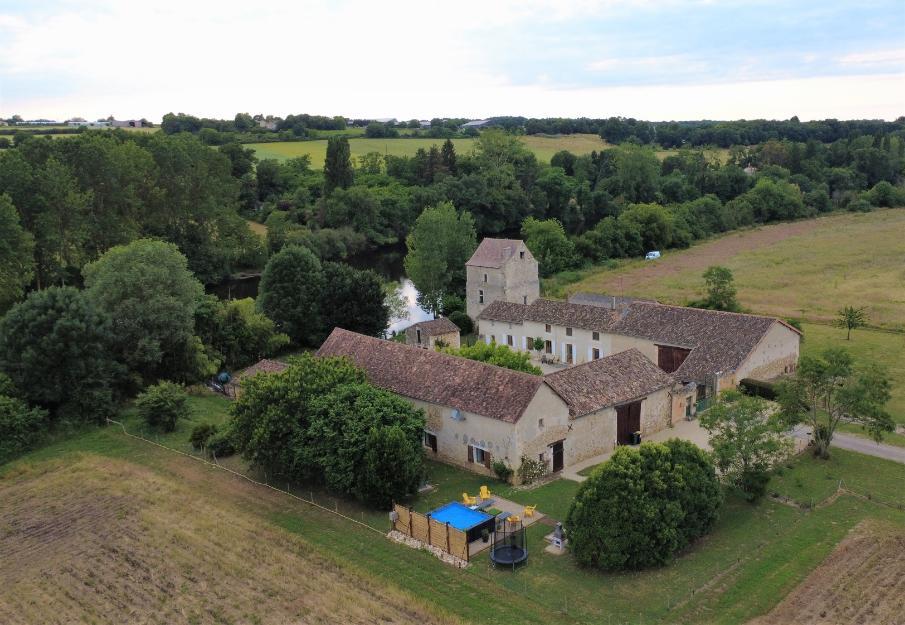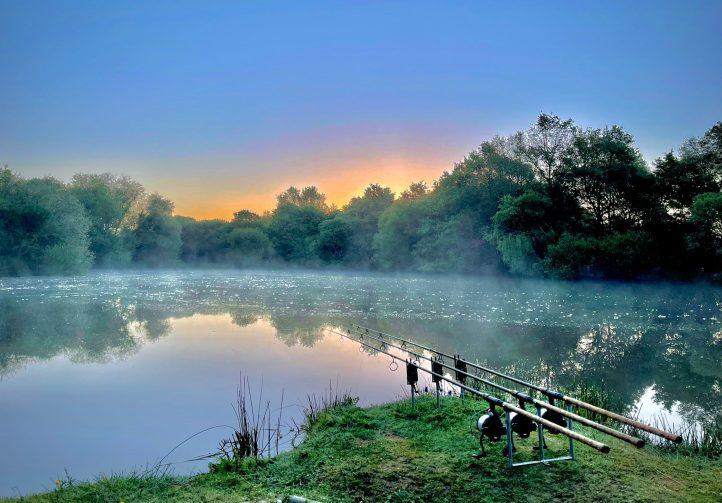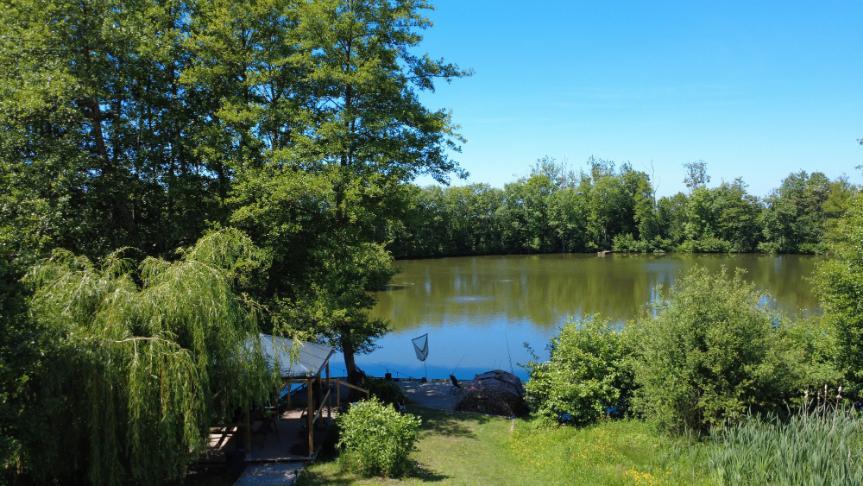For many carp anglers, owning a lake in France isn’t just a far-off dream — it’s the ultimate lifestyle move. Imagine stepping out of your house and straight into your swim, or welcoming paying anglers from across Europe to fish a lake you own. With lower property prices than the UK, a strong angling culture, and vast rural landscapes, France offers unique opportunities for those serious about carp fishing.

Buying a property is France can be good value for money compared to the UK
But buying a lake isn’t as simple as falling in love with a piece of water. It’s a major financial and legal commitment. Lakes differ enormously in terms of rights, regulations, and potential. Some are perfect as private retreats; others can become thriving commercial fisheries. Understanding the process, doing thorough due diligence, and recognising red flags will help you avoid costly mistakes and secure a property that matches your ambitions.
This guide will walk you through:
How to search effectively and define your goals
The regulations you must be aware of
The due diligence every buyer should carry out
The difference between buying an existing fishery and starting from scratch
The key red flags to look out for.
Why Buy a Carp Lake in France?
Value for Money
Compared to the UK, rural French property — especially land with lakes — is not only more affordable but also offers far greater choice. In the UK, securing a property with a sizeable lake and surrounding land is, for most buyers, little more than a distant dream.
Lifestyle
Beyond the fishing, owning a lake in France often brings a slower, more relaxed pace of life. That said, managing a fishery does come with responsibilities — regular maintenance is part of the package, and sooner or later some larger jobs will need tackling. Still, the rewards are clear: warmer summers, tranquil countryside, and immersion in French culture. For many buyers, it’s not just about the angling, but a complete lifestyle change.
Business Potential
Carp fishing holidays in France remain hugely popular, with demand from UK and European anglers showing no sign of slowing down. A well-run venue with the right facilities can generate solid income. Many lake owners blend lifestyle with business, living on-site while hosting anglers.
Quality of Fishing
France is synonymous with big carp. Many lakes boast established stocks, and the longer season compared to the UK means more time on the water. Whether for private enjoyment or as a commercial draw, the fishing potential is a huge factor.

How to Conduct Your Search
1. Define Your Goal
Start by being clear on your motivation.
Private Use: A peaceful retreat for family and friends, where rules and atmosphere are entirely yours to set.
Commercial Fishery: A business venture requiring facilities, marketing, and compliance with regulations.
Your goal will affect everything — from location to lake size to the level of investment required.
2. Choose the Right Location
Accessibility matters. If your plan is to attract UK anglers, lakes within a few hours’ drive of Calais, Caen, or St. Malo will be more marketable. More remote regions may offer cheaper property and stunning settings, but long travel times can deter paying guests.
Think also about amenities: proximity to airports, towns for supplies, and whether the region is already popular with anglers.
3. Use Local Expertise
French property law can be complex, especially with lakes. Work with:
Estate Agents familiar with lakes and leisure properties.
Notaires (solicitors) who are bilingual and experienced in cross-border transactions.
Specialist Surveyors for lakes and dams, who can flag costly maintenance issues.
Key Regulations to Understand
DTT (Domaine de l’État)
Some lakes are classified as connected to public waterways, meaning the state retains rights. Always clarify whether the lake is closed (private, with full stocking and fishing rights) or open (subject to public regulations). Ownership without private rights can severely limit your options.
Fish Stock Regulations
It is illegal to import or move carp without proper permits. Sellers should provide evidence that fish stocks were legally introduced. Breaching stocking laws can lead to heavy fines and even fish removal.
Planning and Development
Adding facilities like swims, cabins, or shower blocks may require planning permission. Local communes vary in strictness, so don’t assume you can expand without approval.
Running a Business
If you intend to host paying anglers, you must register the business locally, pay taxes, and meet health and safety standards. Some communes also require inspections or specific licences.
Due Diligence: What to Check Before Buying
Buying a lake is not just about falling in love with the setting. You need to validate every detail.
Fish Stocks
The value of a carp lake lies heavily in its fish. A 5-acre lake with a thriving stock of 40lb+ carp is worth far more than an empty water. To validate stock:
Request Records – Sellers should provide invoices, health certificates, or permits from legal suppliers.
Netting – Commission a professional survey to assess stock levels, health, and biomass.
Visual Checks – Walk the banks, observe feeding activity, and if the fishery is an existing commercial business make contact with anglers who have previously fished the lake.
Without verified stock, you risk buying a “dead” lake that may cost tens of thousands to restock legally.

Netting is critical to the due diligence when buying a French carp lake
Water Rights
Ensure water rights are private, and clarify who controls inflows, outflows, and sluices. Any ambiguity here is a major risk.
Infrastructure and Maintenance
Inspect dams, sluices, and banks. Repairing or dredging can be extremely costly. Confirm responsibility for upkeep with the notaire.
Access and Boundaries
Confirm legal access roads and exact property boundaries. A lake with disputed access or unclear borders can become a nightmare.
Environmental Considerations
Check for protected species, flooding risks, and local environmental restrictions.
Buying an Existing Fishery vs. Building from Scratch
Buying an Existing Business
Pros:
Stock is established and proven.
Facilities (swims, cabins, toilets) are already in place.
Existing customer base and bookings can provide instant income.
Cons:
Higher purchase price.
You inherit any problems (poor maintenance, weak marketing, overstocking).
Buying a Non-commercial Lake
Pros:
Often cheaper to purchase.
Freedom to develop your own business model and branding.
More flexibility in location and type of lake.
Cons:
Stocking costs can be very high.
Development requires permits and investment in infrastructure.
Marketing and reputation must be built from scratch.
Many buyers underestimate the time and money it takes to turn a private lake into a viable business. While margins can be strong, success requires investment, hard work, and smart marketing.

With hard work the you can create thriving French carp fishing business
Red Flags to Watch Out For
Unclear Water Rights – If the seller can’t prove the lake is private, walk away.
No Proof of Legal Stocking – Stock without paperwork could be seized.
Access Disputes – Legal battles with neighbours over roads or tracks can sink a purchase.
Inflated Prices – Don’t pay “dream lake” prices without evidence of income and bookings.
Maintenance Neglect – Crumbling sluices, leaking dams, or silted lakes can cost a fortune to put right.
Conclusion
Owning a carp lake in France can be life-changing. For some, it’s a tranquil escape where fishing dreams come true. For others, it’s a chance to build a rewarding angling business. But success depends on doing your homework.
Define your goals early, use expert help, and never skip due diligence. Validate fish stocks, confirm water rights, and look carefully at infrastructure. Decide whether an established fishery or a blank canvas better suits your ambitions.
Get it right, and you’ll not only own a slice of rural France but also enjoy the unique pride of waking each day beside your very own carp lake.